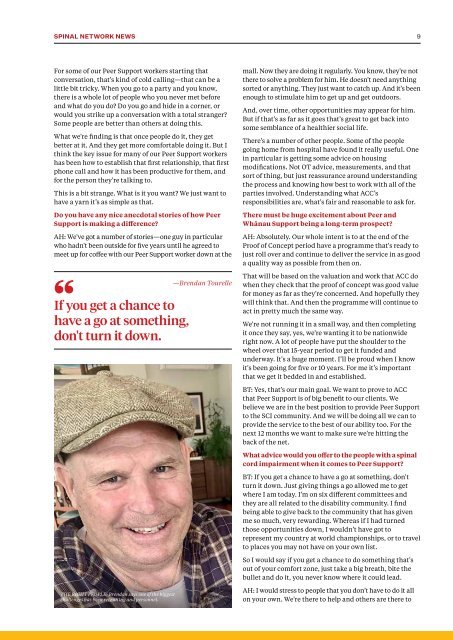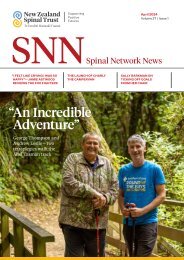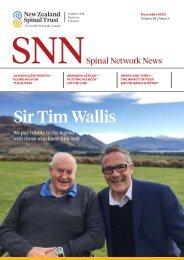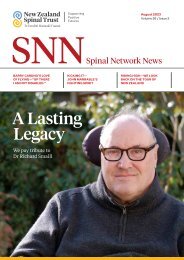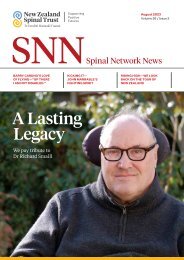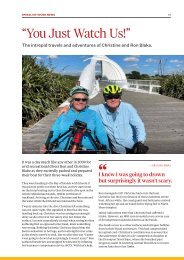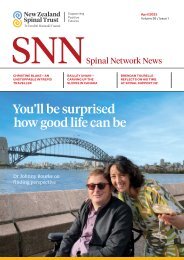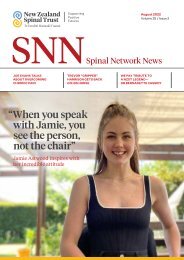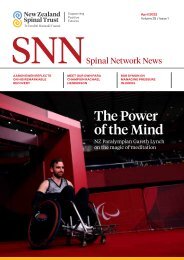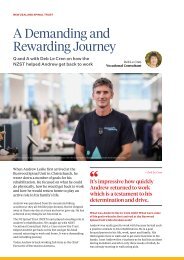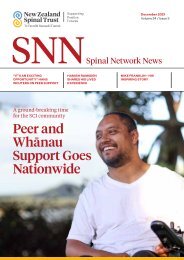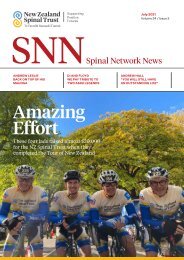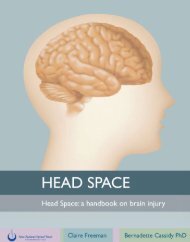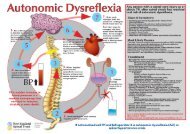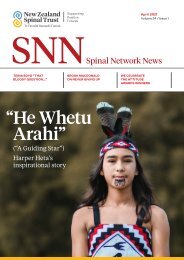SNN_December 2022 Issue_web low res
You also want an ePaper? Increase the reach of your titles
YUMPU automatically turns print PDFs into web optimized ePapers that Google loves.
SPINAL NETWORK NEWS 9<br />
For some of our Peer Support workers starting that<br />
conversation, that's kind of cold calling—that can be a<br />
little bit tricky. When you go to a party and you know,<br />
there is a whole lot of people who you never met before<br />
and what do you do? Do you go and hide in a corner, or<br />
would you strike up a conversation with a total stranger?<br />
Some people are better than others at doing this.<br />
What we're finding is that once people do it, they get<br />
better at it. And they get more comfortable doing it. But I<br />
think the key issue for many of our Peer Support workers<br />
has been how to establish that first relationship, that first<br />
phone call and how it has been productive for them, and<br />
for the person they're talking to.<br />
This is a bit strange. What is it you want? We just want to<br />
have a yarn it’s as simple as that.<br />
Do you have any nice anecdotal stories of how Peer<br />
Support is making a difference?<br />
AH: We've got a number of stories—one guy in particular<br />
who hadn't been outside for five years until he agreed to<br />
meet up for coffee with our Peer Support worker down at the<br />
If you get a chance to<br />
have a go at something,<br />
don't turn it down.<br />
—Brendan Tourelle<br />
mall. Now they are doing it regularly. You know, they're not<br />
there to solve a problem for him. He doesn't need anything<br />
sorted or anything. They just want to catch up. And it's been<br />
enough to stimulate him to get up and get outdoors.<br />
And, over time, other opportunities may appear for him.<br />
But if that's as far as it goes that's great to get back into<br />
some semblance of a healthier social life.<br />
There's a number of other people. Some of the people<br />
going home from hospital have found it really useful. One<br />
in particular is getting some advice on housing<br />
modifications. Not OT advice, measurements, and that<br />
sort of thing, but just reassurance around understanding<br />
the process and knowing how best to work with all of the<br />
parties involved. Understanding what ACC’s<br />
<strong>res</strong>ponsibilities are, what's fair and reasonable to ask for.<br />
There must be huge excitement about Peer and<br />
Whānau Support being a long-term prospect?<br />
AH: Absolutely. Our whole intent is to at the end of the<br />
Proof of Concept period have a programme that's ready to<br />
just roll over and continue to deliver the service in as good<br />
a quality way as possible from then on.<br />
That will be based on the valuation and work that ACC do<br />
when they check that the proof of concept was good value<br />
for money as far as they're concerned. And hopefully they<br />
will think that. And then the programme will continue to<br />
act in pretty much the same way.<br />
We're not running it in a small way, and then completing<br />
it once they say, yes, we're wanting it to be nationwide<br />
right now. A lot of people have put the shoulder to the<br />
wheel over that 15-year period to get it funded and<br />
underway. It's a huge moment. I’ll be proud when I know<br />
it's been going for five or 10 years. For me it’s important<br />
that we get it bedded in and established.<br />
BT: Yes, that's our main goal. We want to prove to ACC<br />
that Peer Support is of big benefit to our clients. We<br />
believe we are in the best position to provide Peer Support<br />
to the SCI community. And we will be doing all we can to<br />
provide the service to the best of our ability too. For the<br />
next 12 months we want to make sure we're hitting the<br />
back of the net.<br />
What advice would you offer to the people with a spinal<br />
cord impairment when it comes to Peer Support?<br />
BT: If you get a chance to have a go at something, don't<br />
turn it down. Just giving things a go al<strong>low</strong>ed me to get<br />
where I am today. I'm on six different committees and<br />
they are all related to the disability community. I find<br />
being able to give back to the community that has given<br />
me so much, very rewarding. Whereas if I had turned<br />
those opportunities down, I wouldn’t have got to<br />
rep<strong>res</strong>ent my country at world championships, or to travel<br />
to places you may not have on your own list.<br />
So I would say if you get a chance to do something that's<br />
out of your comfort zone, just take a big breath, bite the<br />
bullet and do it, you never know where it could lead.<br />
THE RIGHT PEOPLE: Brendan says one of the biggest<br />
challenges has been recruiting and personnel.<br />
AH: I would st<strong>res</strong>s to people that you don’t have to do it all<br />
on your own. We're there to help and others are there to


